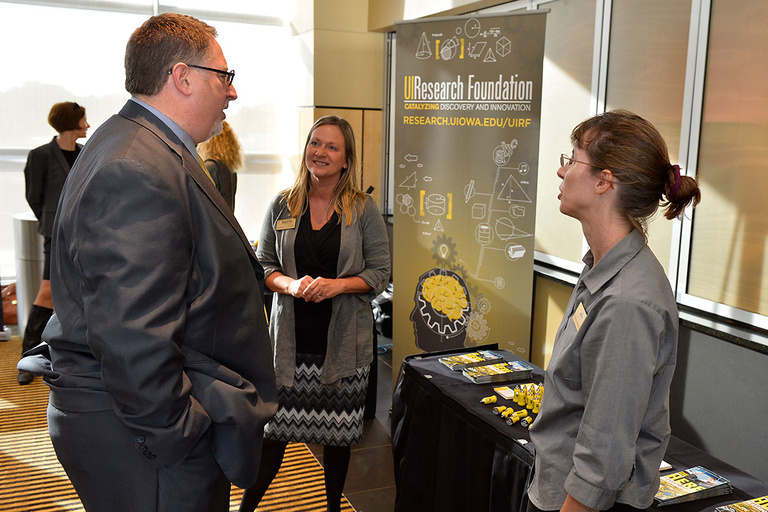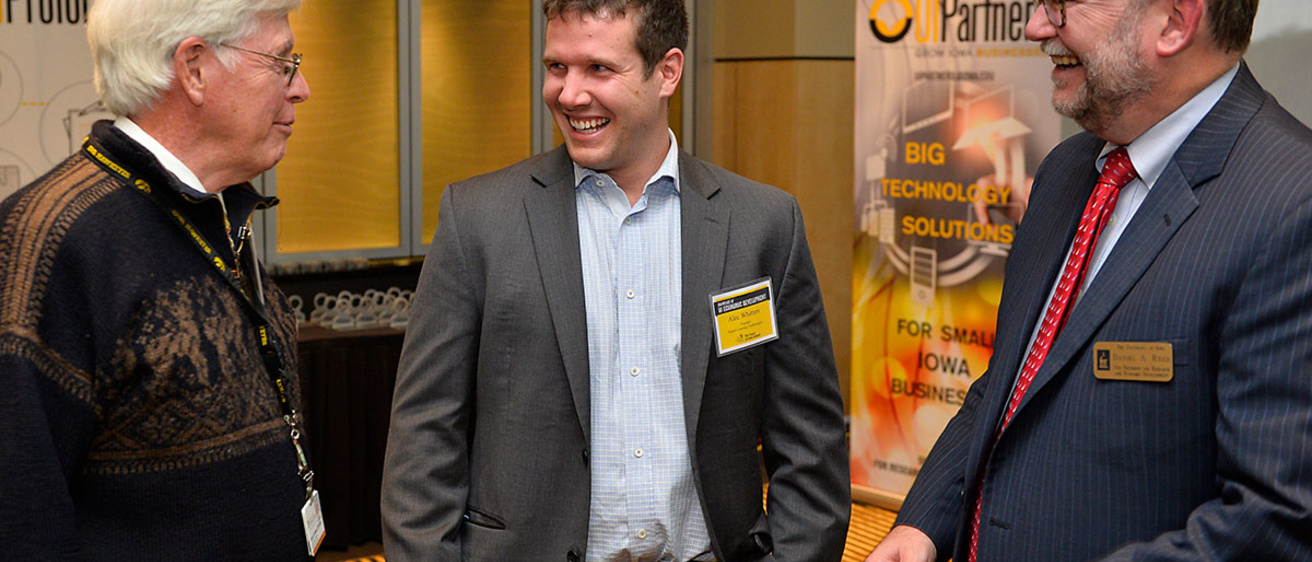University of Iowa officials on Monday spelled out the university’s collective efforts for supporting small businesses and entrepreneurs, cultivating Iowa’s workforce, and putting the state on the path to economic prosperity.

The remarks were part of an Economic Development Showcase, held in the McCord Club Lounge of Kinnick Stadium. An estimated 150 people attended, including local government and economic development officials, state legislators, local entrepreneurs, and faculty and students.
The event also featured tables with information about the university’s broad economic development activities, including representation from the UI College of Engineering, the John Pappajohn Entrepreneurial Center (JPEC), and units and initiatives within the Office of Research and Economic Development.
Other speakers included Iowa state Sen. Bob Dvorsky; Dr. Matt Howard, the UI’s John C. VanGilder Chair in Neurosurgery and founder (along with Dr. Timothy Brennan) of Direct Spinal Therapeutics; and former UI student Alec Whitters, a founder of Higher Learning Technologies, which creates study and test-prep apps.
Under the umbrella tagline “We Mean Business,” Reed spelled out some of the many resources and initiatives now in place at the UI to support budding entrepreneurs, Iowa small business owners and employees, faculty who want to commercialize their research, and students interested in exploring careers in Science, Technology, Engineering and Mathematics (STEM).
Those include UI Partners, designed to help small Iowa companies innovate and grow by solving their IT challenges; UI Ventures, an initiative designed to accelerate faculty, post-doctorate, and student startups and cultivate entrepreneurship; UI ProtoLabs, a three-facility prototyping resource open to faculty, students and staff, startups, businesses, and the general public; the UI Research Foundation and UI Research Park, which he said “are critical to supporting faculty innovation and business startups”; and the John Pappajohn Entrepreneurial Center in the Tippie College of Business.
“When we talk about economic development, we mean business,” he said. “We’re serious about it, and we’re committed to enhancing the business climate.”
He said the university’s collective work has already paid dividends, which include:
- Invention disclosures are up 44 percent over last year
- There are 24 startups in the pipeline, 10 new this year
- 53 student businesses are under development through JPEC
- 36 companies are now in the University of Iowa Research Park, employing more than 1,800 people
- Faculty/student teams completed 55 business consulting projects at 42 companies in eight Iowa counties
- 15 business teams attended Venture Schools to assess startup ideas
Moving forward, Reed said new and innovative partnerships among government, academia and industry are critical to create and transmit knowledge into the marketplace, enhance research and development, and develop innovative, globally competitive policies.
He cited as an example the rich opportunities for partnership presented by the recent proposal by his office to secure $3 million in state funding over three years to establish the Autonomous Intelligent Machines and Systems (or AIMS) Institute. The institute would bring together industry leaders and experts at the university in human factors, safety, and engineering work at the National Advanced Driving Simulator, the UI Center for Computer Aided Design, and the Operator Performance Laboratory, among others.
AIMS would be dedicated to researching, developing, testing, and examining public policy implications of self-driving cars, unmanned aircraft systems, and other autonomous machines and systems.
It would also, Reed said, put Iowa at the forefront of research and commercialization in this emerging area.
To keep moving the ball forward on economic development, Reed said—using a football analogy—it’s important to recognize that “sometimes you run, sometimes you pass, but neither succeeds without the other.
“We win based on our collective and coordinated talent, strategy, and adaptive execution,” he said.
